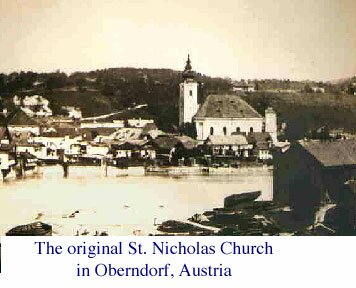 The young priest was worried. Within 24 hours he was supposed to lead a Christmas Eve service, but he had no music. The Salzach River that flowed near the village church of Oberndorf, Austria, caused chronic moisture which had rusted the pipe organ. Without the organ there would be no music. And what was Christmas Eve without music?
The young priest was worried. Within 24 hours he was supposed to lead a Christmas Eve service, but he had no music. The Salzach River that flowed near the village church of Oberndorf, Austria, caused chronic moisture which had rusted the pipe organ. Without the organ there would be no music. And what was Christmas Eve without music?
Father Josef Mohr had but recently come to this tiny village. The night of December 23 he had attended the town Christmas play. But instead of going home afterwards, he had climbed the small mountain overlooking the town and soaked in the beauty and quiet of the darkness. It was nearly midnight before he reached his room. And so in the wee hours of December 24, 1818, he sat down to pen a new song, one which could be played on a guitar--at least that wasn't broken.
"Stille Nacht! Heilige Nacht!" he wrote. "Silent night, holy night." The nighttime peacefulness of Oberndorf was fresh in his mind; beyond it he could imagine Bethlehem, bathed in moonglow:
All is calm, all is bright.
Round yon Virgin Mother and child!
Holy Infant so tender and mild,
Sleep in heavenly peace.
The words were flowing now. He could visualize shepherds quaking, shaken from the quietness of their vigil by the glories streaming from heaven. He could see the child's countenance:
Son of God, love's pure light,
Radiant beams from Thy holy face,
With the dawn of redeeming grace,
Jesus, Lord, at Thy birth.
 It wasn't long 'til the simple poem was finished. Now, perhaps he could sleep. The next morning he brought the poem to his organist, Franz Grüber. "I know it's the last minute," he must have said, "but could you put a tune to this song for the service tonight? Something simple that I could accompany on the guitar?" Father Mohr was new to the parish, and to the church's chief musician. But then, Grüber was being paid, and at that moment his beloved organ wouldn't work. Grüber set about the task quickly and in a couple of hours he was done, just in time to rehearse with the choir before the service. Mohr sang tenor, Grüber sang bass, and the service went off beautifully with the new song. "Stille Nacht! Heilige Nacht!"
It wasn't long 'til the simple poem was finished. Now, perhaps he could sleep. The next morning he brought the poem to his organist, Franz Grüber. "I know it's the last minute," he must have said, "but could you put a tune to this song for the service tonight? Something simple that I could accompany on the guitar?" Father Mohr was new to the parish, and to the church's chief musician. But then, Grüber was being paid, and at that moment his beloved organ wouldn't work. Grüber set about the task quickly and in a couple of hours he was done, just in time to rehearse with the choir before the service. Mohr sang tenor, Grüber sang bass, and the service went off beautifully with the new song. "Stille Nacht! Heilige Nacht!"
A master organ builder eventually came to Oberndorf to repair the rusted organ, and there learned of the carol. He copied the song and doubtless sang it as he worked on organs in the neighboring villages. From him, two families of traveling folk singers, similar to the Trapp Family Singers of "Sound of Music" fame, learned of the song and sang it in concerts all over Europe. In 1834 the Strasser family performed it for the king of Prussia, who ordered it sung every Christmas Eve by his cathedral choir. The Rainer family singers brought it to America in 1839. By mid-century it had become popular around the world, but no one could recall its composer.
The story of its fame was long to reach the tiny villages of Austria. But in 1854, Franz Grüber sent a letter to the leading musical authorities with his claim to have written the tune. In 1848 Father Mohr had died of pneumonia, but Grüber still had the original manuscript to show, and gradually he was recognized as composer.
Sometimes the smallest churches make the biggest contributions. In this case, God presented a most wonderful carol to the world from a tiny congregation, one that just happened to be called St. Nicholas' Church of Oberndorf.
In 1863, nearly fifty years after "Silent Night" was written in German, it was translated into English (by either Jane Campbell or John Young). In 1871 the English version was published for the first time in an American hymnal: Charles Hutchins' Sunday School Hymnal.
|
Silent Night in English:
Silent night, Holy night, Silent night, Holy night, Silent night, Holy night, |
Silent Night in German:
Stille Nacht, heilige Nacht, Stille Nacht, heilige Nacht, |
|
Silent Night in Polish
Cicha noc, s`wie`ta noc, Cicha noc, s`wie`ta noc, Cicha noc, s`wie`ta noc, |
Silent Night in Sapnish
Noche de paz, noche de amor, Noche de paz, noche de amor, Noche de paz, noche de amor, |